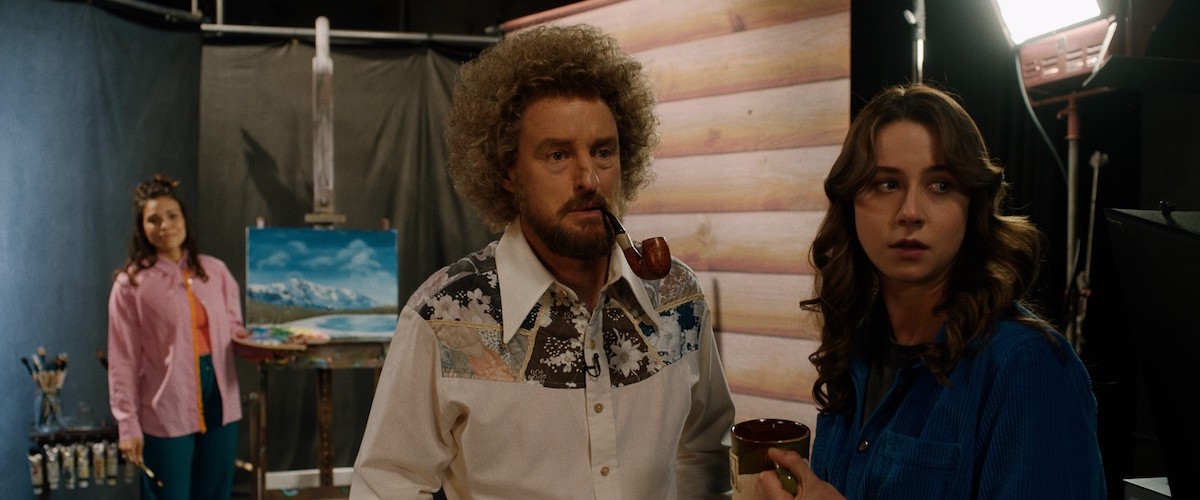It’s incredibly challenging to separate Bob Ross from “Paint.” Yes, Owen Wilson has the same afro, the pillowy whisper, and joy in painting nature’s landmarks. But technically, this is the story of Carl Nargle, a Vermont-based public access fixture on the downfall of his local celebrity thanks to a creative rut and some problematic relationships with women at work.
And yet, Ross haunts this film. For one, the likeness is how writer/director Brit McAdams wants to hook viewers, to see what an “Owen Wilson as Bob Ross movie” could be. But McAdams struggles to expand upon Ross’ calming image by showing how he could be problematic, using the true story that the real Ross had an affair with a business partner and was handsy with his women co-workers. “Paint” doesn’t have the comedic or dramatic chops to make this approach entertaining or interesting. Ross always preached that there were no mistakes, just happy accidents. A mess like “Paint”—all broad strokes and no point—proves that he wasn’t always right.
There’s a big hole in McAdams’ directorial debut where our compassion for Carl should be. Carl is stuck at the beginning of “Paint” and finds himself repeatedly painting the same landmark of Mt. Mansfield (one of many ongoing jokes that would be funnier with better pacing). Such creative stasis makes way for a weak subplot about a replacement—a younger painter named Ambrosia (Ciara Renée) who follows his time slot and can fill two complete canvases in one hour, as opposed to Carl’s one. Ambrosia becomes the station’s hero, rendering the egotistical Carl into old news. A personal crisis brews within Carl, and a competition at the station begins. Suddenly his boss (Stephen Root) isn’t his champion anymore, but another person trying to push him out the door tactfully.
As “Paint” moves on from one airless sequence to the next, the annoying problem of Carl being an unamusing jerk is supplanted by other frustrations. Here’s a guy who has made a career out of painting for public access—in modern times, somehow, mind you—and also has borderline inappropriate relationships with his female co-workers. The swooning women behind the camera want to be his muse, and we see how easy it is for him to get them into his orange van (with a foldout bed inside) or on a date. That’s a big joke that this movie wants to toss into the mix, but “Paint” merely presents it, as it does so many other of its chintzy facets. This is coupled with a more sincere story that doesn’t fit—Carl’s longing for Katherine (Michaela Watkins), who once had a deeper relationship with him until something trashed it. We’re not sure how exactly the movie wants us to feel about all of this, but it feels awkward and not funny.
The world-building in “Paint” is about challenging the wholesomeness of what makes a Bob Ross—the public broadcasting station that would make his soothing paint tutorial shows a phenomenon, the little town he would become a celebrity in, and the innocence with which he presented himself. But the film distances itself from sharper predecessors like Mike Judge (“Extract“) with its bad gags and weak wordplay. One of the studio employees (Lucy Freyer’s Jenna) wants to get with Carl, but he’s hesitant, and Wilson plays him as far too naive in moments in which she’s firing out innuendos at a fondue dinner. He ends up force-feeding her meat, even though she’s a vegan. She does it for the date despite it making her feel sick, only to sprint to the bathroom later. It’s an eye-rolling sequence, but it’s one-upped by a flashback in which co-worker Wendy (Wendi McLendon-Covey) talks to Carl over a transistor radio, all so this movie can make this joke during a break-up: “Are we over-over, over?” A film that was better with tacky jokes would have killed that, but it’s too obvious here within a clunky setup.
There’s a story somewhere here about crummy men no longer ruling the workplace, but that angle becomes less noble, given how the women characters are so one-dimensional. Ambrosia, for example, is an intriguing Carl 2.0 that still gets handled like a novelty by McAdams’ script. We know the things that she likes—her old turquoise car, pizza rolls, and painting UFOs that pour blood—but there’s little space for her own ambitions and arc. Even her sexual relationships with some women in from the channel are treated only at a surface level.
“Paint” tries to have a heart throughout, with its whimsical dialogue about what matters most in life and what makes an artist. Wilson’s folksy performance, like a “Saturday Night Live” imitation drawn to feature-length, can only make it sound so wise—he feels limited by both the shadow of Ross and the material he has to work with. There’s a little more life to be found in Watkins’ performance, however, as she expresses a muted, discernible pain in scenes opposite her lost love showing us flickers of what was. It becomes glaring how much Katherine would be the better focus in this story about loving a truly imperfect artist, given how much its riffing on Bob Ross leads “Paint” astray.
Now playing in theaters.




















